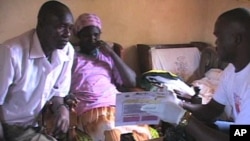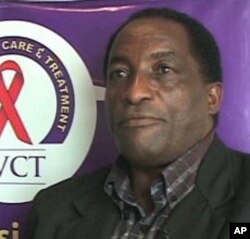HIV counselor Maryanne Wangui and her colleagues had to trudge through ankle-deep mud and streams mixed with raw sewage to get to a settlement outside of Nairobi to test a single mother for HIV.
Wangui says she loves her job with Liverpool Volunteer Counseling and Testing, but in a place like the Kawangware settlement, it can be overwhelming.
"There are some households, you go, there are no seats, there is nothing to sit on," she says. "They [the clients] will also start giving you so many stories. Maybe some have not eaten for days. Some have got problems, although we really try to focus on HIV/AIDS."
The Kenyan and U.S. governments, along with the Global Business Coalition, launched the two-year HIV Home Testing Program in April 2009.
The initiative targets two million people in households across Kenya.
It supports the Kenyan government's goal of informing 80 percent of Kenyans about their HIV status by the end of this year. Kenya's HIV infection rate stands at around seven percent. The highest new infection rate occurs among men and women in committed relationships.
And people in those relationships stand to gain the most from home testing, says Dr. Nicholas Muraguri, head of Kenya's National AIDS/STD Control Program.
"One of the problems we are having is disclosure," he says. "A lot of people come and test HIV positive and they do not inform their sexual partners at all. That limits the opportunity to actually be able to prevent HIV and also access treatment."
Finding out that a family member is HIV positive can be devastating. Maryanne Wangui says she and other counselors at times feel like home wreckers when they deliver the bad news.
"I have a colleague who experienced that the lady turned out to be HIV positive and the man turned out to be HIV negative. They said they would not have any commotion, they would go for couple counseling, they would go to Kenyatta [National Hospital]," she said. "But later, the next day, the lady called the counselor and said that she was battered by the man and she was sent out of the house."
Dr. Muraguri says door-to-door counselors undergo special training on how to test couples and families.
But he says there are not enough resources to provide longer-term counseling or even to test everyone who wants to be tested at home. He says the initiative is short 30 percent of trained counselors.
Counselor David Kihiu says the work is stressful.
"I tested a family of four who were all HIV positive," he says. "Then, when I moved to the next family, three of them were HIV positive. The third family was also HIV positive. So, [I experienced] a lot of burn-out - I was just wondering, what would these families do with themselves, and I was wondering whether I have actually given the right information. I was just saying, if I test all these families, are they going to be the same? What possible will be there? I was stressed."
Kihiu, Wangui and others turn to their peers and supervisors for support. Liverpool Volunteer Counseling and Testing holds weekly group sessions and have counselors available to work with staff members who are experiencing anxiety or burnout.
Counselors interviewed by VOA say that, despite the challenges, their work gives them satisfaction. They say they reach many people who normally would not seek out testing in clinics.






